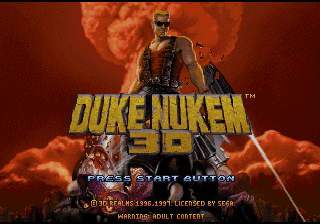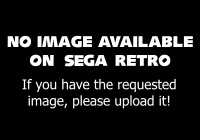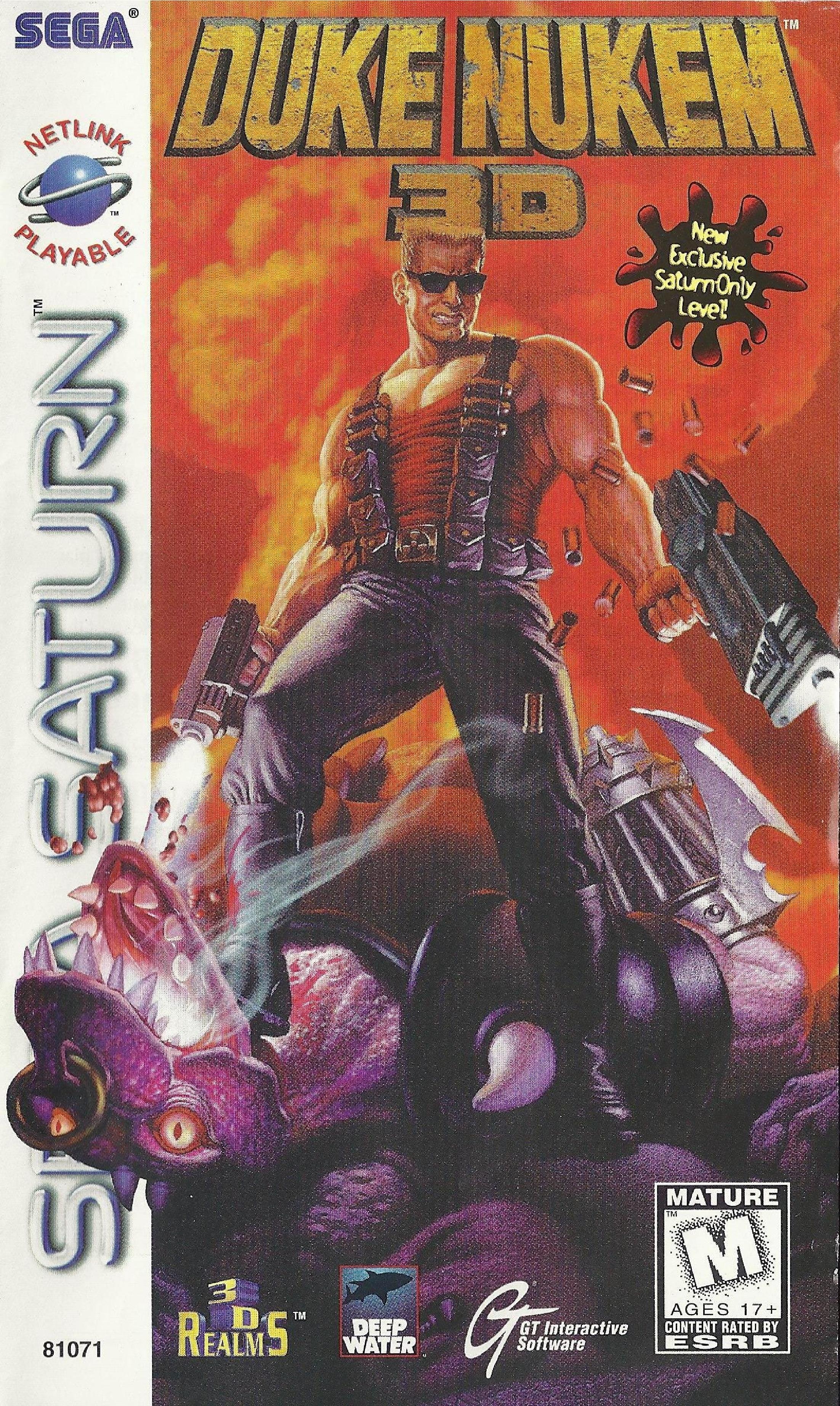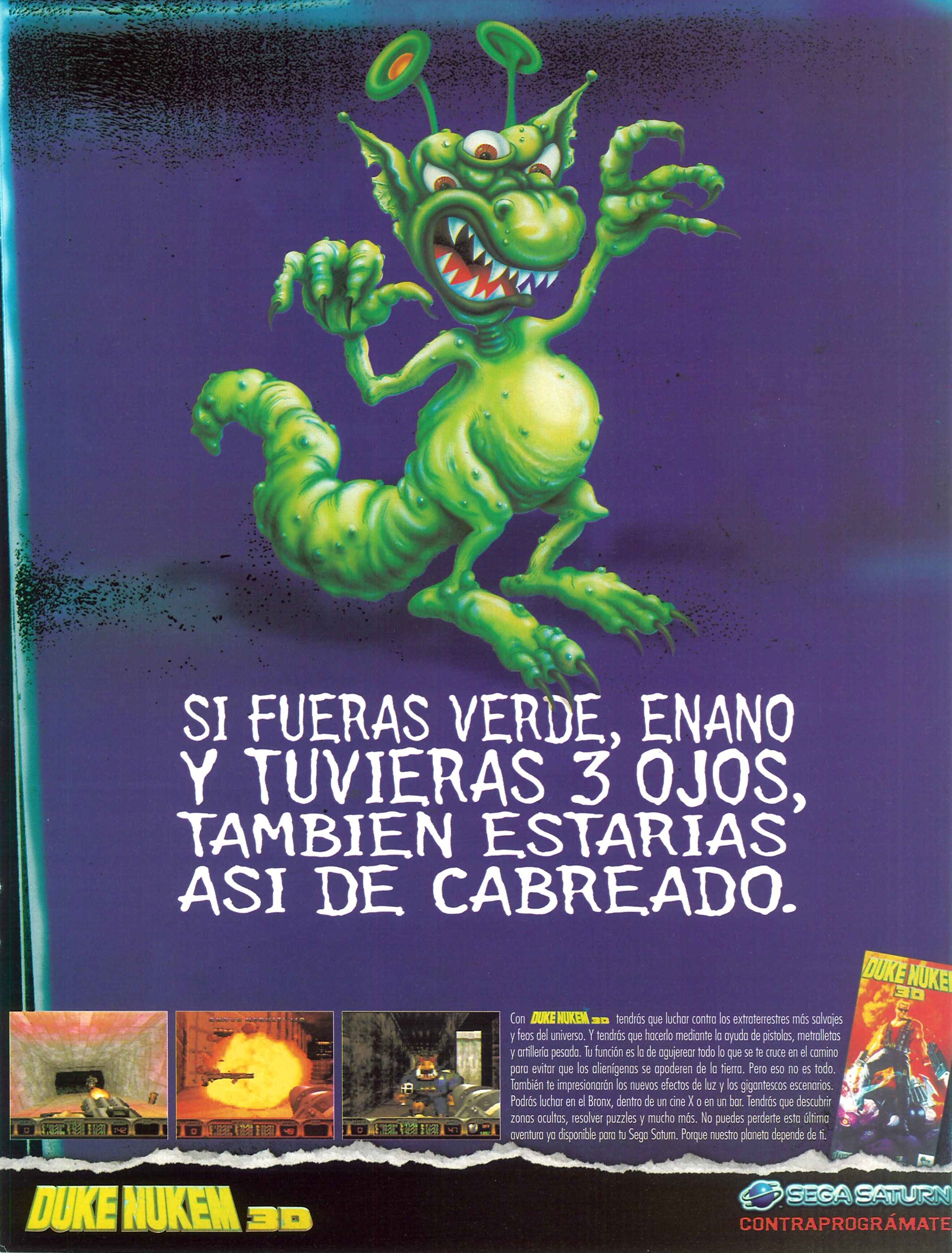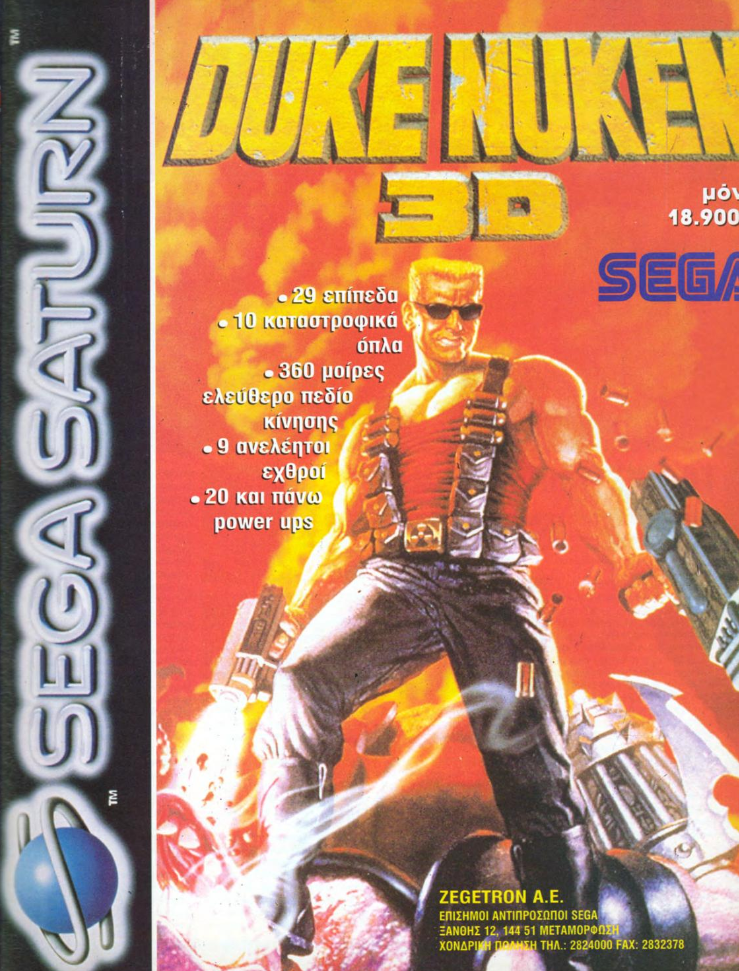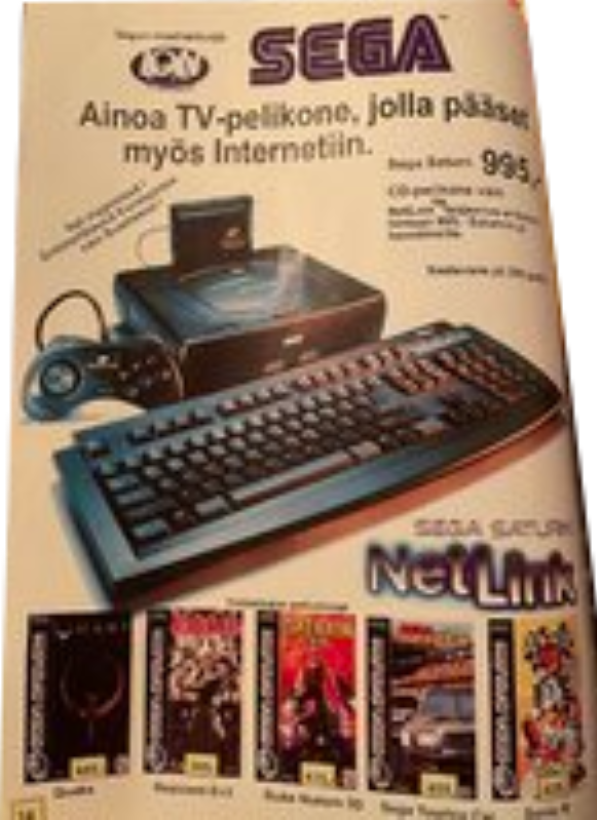- For the Sega Mega Drive game, see Duke Nukem 3D (Mega Drive).
This teeny-tiny article needs some work. You can help us by expanding it.
Duke Nukem 3D is a Sega Saturn first-person shooter developed by Lobotomy Software and published by Sega. A port of the titular 1996 IBM PC game Duke Nukem 3D, it was first released in the United States and Europe in October 1997[1][7], and notably takes advantage of the analog features of Sega's 3D Control Pad.
Gameplay
The Saturn port also contains an exclusive level named "Urea 51."
Controls
"Duke Nukem 3D makes use of either the digital controller or the 3D Control Pad for more precise control. Since not all the actions could be mapped onto either controller, the game does not allow you to crouch. To look up or down, you hold the look button ( on default) and move the D-pad or analog stick. To access items or to toggle the map on or off, you must pause the game to activate those functions. In order to ascend or descend with the jet pack item or underwater, hold the Jump button (
on default) and move the D-pad or analog stick. To access items or to toggle the map on or off, you must pause the game to activate those functions. In order to ascend or descend with the jet pack item or underwater, hold the Jump button ( on default) and hold either
on default) and hold either  to go down, or
to go down, or  to go up.
to go up.
Weapons
|
|
Mighty Foot
|
|
|
|
|
Pistol
|
|
|
|
|
Shotgun
|
|
|
|
|
Ripper Chaingun Cannon
|
|
|
|
|
RPG Launcher
|
|
|
|
|
Pipe Bombs
|
|
|
|
|
Shrinker
|
|
|
|
|
Devastator
|
|
|
|
|
Tripbomb
|
|
|
|
|
Freezethrower
|
|
|
Items
Health
|
|
Medkit
|
|
|
|
|
Atomic Health Unit
|
|
|
|
|
Armor
|
|
|
Inventory items
|
|
Access Cards
|
|
|
|
|
Steriods
|
|
|
|
|
Holoduke
|
|
|
|
|
Jetpack
|
|
|
|
|
Night Vision Goggles
|
|
|
|
|
Scuba Gear
|
|
|
|
|
Protective Boots
|
|
|
Enemies
|
|
Assault Trooper
|
|
|
|
|
Assault Captains
|
|
|
|
|
Protozoid Slimers
|
|
|
|
|
Pig Cops
|
|
|
|
|
Recon Patrol Vehicles
|
|
|
|
|
Enforcers
|
|
|
|
|
Octabrain
|
|
|
|
|
Battlelord
|
|
|
|
|
Battlelord Sentry
|
|
|
|
|
Assault Commander
|
|
|
|
|
Sentry Drone
|
|
|
|
|
Overlord
|
|
|
|
|
Cycloid Emperor
|
|
|
Levels
- Despite being a later release for the Saturn, the game does not support saving directly to Saturn Backup Memory and saves to internal battery memory only, but does allow loading from Backup Memory if a save is detected.
|
|
Hollywood Holocaust
|
|
|
|
|
The Red Light District
|
|
|
|
|
Death Row
|
|
|
|
|
Toxic Dump
|
|
|
|
|
The Abyss
|
|
|
|
|
The Launching Facility
|
|
|
|
|
Spaceport
|
|
|
|
|
The Incubator
|
|
|
|
|
Warp Factor
|
|
|
|
|
Fusion Station
|
|
|
|
|
Occupied Territory
|
|
|
|
|
Tiberius Station
|
|
|
|
|
Lunar Reactor
|
|
|
|
|
The Dark Side
|
|
|
|
|
Overlord
|
|
|
|
|
Raw Meat
|
|
|
|
|
Bank Roll
|
|
|
|
|
Flood Zone
|
|
|
|
|
L.A. Rumble
|
|
|
|
|
Movie Set
|
|
|
|
|
Rabid Transit
|
|
|
|
|
Fahrenheit
|
|
|
|
|
Urea 51
|
|
|
|
|
Hotel Hell
|
|
|
|
|
Stadium
|
|
|
Sega NetLink
Duke Nukem 3D was one of the few games that made use of the Sega Saturn's Sega NetLink modem for multiplayer between two players. Players had the choice of playing through the Single Player game cooperatively or competitively through "Dukematch" across all the levels in the game.
While in-game the Saturn Keyboard or NetLink Keyboard Adapter can be used to text chat with the other player. However, the keyboard cannot be used to control player movement and is used strictly for typing text.
History
Release
Duke Nukem 3D is part of Sega's Deep Water label to recognize games created for mature audiences.
Versions
Rather than running in Ken Silverman's original Build engine used to power the PC version of Duke 3D, the Saturn version runs on Lobotomy's own in-house 3D "SlaveDriver" engine, previously seen with PowerSlave/Exhumed and set to be seen again with Quake. Improvements to the SlaveDriver engine in this iteration include the ability to support larger maps, as well as more dynamic lighting.
Conversely, the Build engine was at its heart a 2D system making use of raycasting solutions (much like the earlier Wolfenstein 3D and Doom), leading to visible distortions when the player looks up or down. The converted maps of the Saturn version mean this is no longer an issue, and many other graphical quirks associated with raycasting are also eliminated.
Like most console conversions of the era, the game aims for a 30FPS frame rate but regularly misses its target. It does, however, perform more consistently than its rival PlayStation conversion, whose use of a Build-esque software rendering engine and unlocked frame rate causes gameplay to run between rare highs of 60FPS and lows of 10FPS, depending on the scene.
The Saturn version is also more accurate than the Nintendo 64 conversion, retaining more of the PC game's original graphics and offering an in-game soundtrack. However, the N64 port benefits from the system's analogue controls, smoother frame rate and split-screen multiplayer option.
Production credits
- Executive Producer: Paul Lange, Brian McNeely
- Project Managers: Dominick Meissner, Patrick Schreiber
- Game and Stage Redesign: Dominick Meissner
- Programming Lead: Patrick Schreiber
- Programming Team: Patrick Schreiber, John Yuill, Ezra Dreisbach
- 3D Engine: Ezra Dreisbach
- Brew World Editing Tool: David Lawson
- Additional Programming: Paul Haugerud, Kurt Pfeifer
- Lead Artist: Troy Jacobson
- Ambient Lighting and Object Editing: William Vallieres
- Additional Art: Kevin Chung, Eric Klokstad
- Sound Effect and Music Arrangement: Scott Branston
- Quality Assurance: Tom Kristensen
- Additional Stage Design: Ezra "Urea 51" Dreisback, Brian McNeely, David Lawson, William Vallieres, Tom Kristensen
- Peepshow Animation Tool: Paul Schreiber
- Art Processing Tools: John Yuill, Ezra Dreisbach, Patrick Schreiber
- MIA: Kurt Pfeifer, John Schwab
- Urea 51 Bonus Track: "Desolation Sound" By Madcap
- Madcap: Troy Jacobson, Stefan Fritz, Steve Johnson, Jason Dolan, John Fujic
- Special Thanks: Marjacq Micro Ltd., David Locke, Rick "The Ice Cream Man" Wheeler, Steve Hutchins, Mark "Sonic Jam" Maslowicz, Lloyd Kinoshita, Richard Leadbetta, Dan Jevons, Manny Granillo
Sega of America Staff:
- Producer: David Locke
- Assistant Producer: Richard Wheeler
- Game Lead: Arnold Feener
- Assistant Lead: Rick Greer
- Testers: Mike Dobbins, Amy Albertson, Ferdinand Villar, Tony Borba, Jeff Junio, Howard Gibson, Karen Brown, Lloyd Kinoshita, Dennis Lee, Aaron Hommes, Dave Paniagua, Robert Amirkhan, Abe Navarro, Marcus Montgomery, Joe Damon
Source: In-game credits
- Production:
- Marketing:
- Special Thanks: Apogee/3D Realms, Yutaka Yamamoto, Yoshi Nakano (for Net Link development), Geraldine Dessimoz, Marcelyn Ditter, Lydia Gable, Mark Lindstrom, Mark Markey, Anne Moellering, Judie Nybo, Heather Ravenberg, Eileen Sacman, Dan Stevens, and SEEDY crew
- SOA Test Department: Amy Albertson, Robert Amirkhan, Tony Borba, Karen Brown, Joe Damon, Mike Dobbins, Howard Gibson, Aaron Hommes, Jeff Junio, Lloyd Kinoshita, Dennis Lee, Marcus Montgomery, Abe Navarro, Dave Paniagua, Ferdinand Villar
Lobotomy Software Inc.
- Executive Producers: Paul Lange, Brian McNeely
- Project Managers: Dominick Meissner, Patrick Schreiber
- Game Adaption and Stage Design: Dominick Meissner
- Programming Lead: Patrick Schreiber
- Programming Team: Patrick Schreiber, John Yuill, Ezra Drisbach
- 3D Engine: Ezra Dreisbach
- BREW World Editing Tool: David Lawson
- Additional Programming: Paul Haugerud, Kurt Pfeifer
- Lead Artist: Troy Jacobson
- Ambiant Lighting and Object Editing: William Vallieres
- Additional Art: Kevin Chung, Eric Klokstad
- Sound Effect and Music Arrangement: Scott Branston
- Quality Assurance: Tom Kristensen
- Additional Stage Design: Ezra 'Urea 51' Dreisbach, Brian McNeely, David Lawson, William Vallieres, Tom Kristensen
- PeepShow Animation Tool: Paul Schreiber
- Art Processing Tools: John Yuill, Ezra Dreisbach, Patrick Schreiber
- MIA: Kurt Pfeifer, John Schwab
- Special Thanks: Marjacq Mirco Ltd., 3D Realms, Steve Hutchins, Mark Maslowicz, Richard Leadbetter, Dan Jevons, Manny Granillo, Jon Orantes
Source: US manual[8]
Magazine articles
- Main article: Duke Nukem 3D/Magazine articles.
Promotional material
Print advert in
Sega Power (GR) #2: "Októmvrios-Noemvrios 1997" (1997-xx-xx)
Print advert in
Secret Service (PL) #52: "Grudzień 1997" (1997-1x-xx)
also published in: Print advert in
Sega Power (GR) #3: "Dekémvrios 1997-Ianouários 1998" (1998-xx-xx)
Print advert in
Sega Power (GR) #3: "Dekémvrios 1997-Ianouários 1998" (1998-xx-xx)
Print advert in
Neo (PL) #3: "Luty 1998" (1998-xx-xx)
also published in:Physical scans
| Sega Retro Average
|
| Publication
|
Score
|
Source
|
| GamesMaster (UK)
|
86
|
№61, p40/41
|
|
| Saturn, US
|
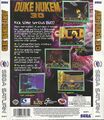  Cover
|
 Disc  Manual |
| Saturn, EU
|
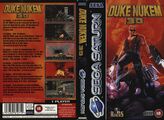 Cover
|
|
|
| Saturn, DE
|
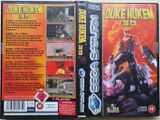 Cover
|
 Disc |
| Saturn, PT
|
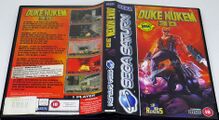 Cover
|
 Disc |
| Saturn, AU
|
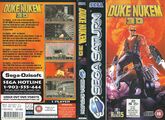 Cover
|
 Disc  Manual |
| Saturn, BR
|
 Cover
|
|
|
Technical information
- Main article: Duke Nukem 3D/Technical information.
ROM dump status
| System |
Hash |
Size |
Build Date |
Source |
Comments |
|
|
|
| ✔
|
|
554,817,984
|
|
CD-ROM (EU)
|
MK81071-50 V1.014
|
|
|
|
| ✔
|
|
564,341,232
|
|
CD-ROM (US)
|
81071 V1.018
|
|
|
|
| ?
|
|
|
1997-09-18
|
|
|
|
|
Page
|
Save data
Duke Nukem 3D makes use of the Saturn's internal battery back-up as the Saturn Backup Memory to save data for progress. This only works for the Single Player game. The game also keeps track of individual player stats for the Death Tank mini game. Death Tank can be unlocked with a game save from PowerSlave/Exhumed and/or Quake so long as they're stored on either the internal or external Back-Up Ram. To load and save data from the Ram Cart, the save file must be created on the internal battery back-up first, then moved over via the Memory Manager.
Duke Nukem 3D Save Data
| Name
|
Comment
|
File Size
|
| DUKENUKEM3D
|
save games
|
14
|
| _DEATHTANK_
|
stats
|
51
|
Quake Save Data
| Name
|
Comment
|
File Size
|
| LOBOQUAKE__
|
save games
|
23
|
Powerslave Save Data
| Name
|
Comment
|
File Size
|
| POWERSLAVE#
|
save games
|
11
|
References
- ↑ 1.0 1.1 http://riehlspot.simplenet.com/vgame/new/saturn.html (Wayback Machine: 1999-02-21 17:22)
- ↑ Press release: 1997-06-19: DUKE NUKEM 3D AND QUAKE MAKE THEIR CONSOLE DEBUT ON SEGA SATURN
- ↑ 3.0 3.1 http://www.sega-europe.com/saturn/satinfo.html (Wayback Machine: 1998-12-02 14:09)
- ↑ Digitiser (UK) (1997-10-25)
- ↑ Computer Trade Weekly, "" (UK; 1997-10-27), page 22
- ↑ 6.0 6.1 Computer & Video Games, "November 1997" (UK; 1997-10-15), page 60
- ↑ 7.0 7.1 7.2 http://www.sega-europe.com/ (Wayback Machine: 1998-02-01 23:27)
- ↑ File:Dukenukem3d sat us manual.pdf, page 45
- ↑ Świat Gier Komputerowych, "11/1997" (PL; 1997-xx-xx), page 40
- ↑ Gry Komputerowe, "12/1997" (PL; 1997-xx-xx), page 12
- ↑ Świat Gier Komputerowych, "12/1997" (PL; 1997-xx-xx), page 24
- ↑ Neo, "Grudzień 1997" (PL; 1997-xx-xx), page 2
- ↑ Świat Gier Komputerowych, "1/1998" (PL; 1997-xx-xx), page 80
- ↑ Secret Service, "Styczeń 1998" (PL; 1998-xx-xx), page 14
- ↑ Secret Service, "Luty 1998" (PL; 1998-xx-xx), page 22
- ↑ Neo, "Kwiecień 1998" (PL; 1998-xx-xx), page 4
- ↑ Neo, "Maj 1998" (PL; 1998-xx-xx), page 4
- ↑ Consoles +, "Octobre 1997" (FR; 1997-xx-xx), page 100
- ↑ Digitiser (UK) (1997-10-29)
- ↑ Edge, "November 1997" (UK; 1997-10-08), page 98
- ↑ Electronic Gaming Monthly, "December 1997" (US; 1997-1x-xx), page 194
- ↑ Gambler, "1/1998" (PL; 1998-xx-xx), page 1
- ↑ GameFan, "Volume 5, Issue 11: November 1997" (US; 1997-xx-xx), page 26
- ↑ GamePro, "December 1997" (US; 1997-xx-xx), page 178
- ↑ Gry Komputerowe, "1/1998" (PL; 1998-xx-xx), page 1
- ↑ Joypad, "Octobre 1997" (FR; 1997-xx-xx), page 98
- ↑ Level, "2/98" (TR; 1998-xx-xx), page 1
- ↑ Mega Console, "Novembre 1997" (IT; 1997-xx-xx), page 64
- ↑ Neo, "Grudzień 1997" (PL; 1997-xx-xx), page 46
- ↑ Saturn Power, "November 1997" (UK; 1997-09-17), page 68
- ↑ Sega Power, "Dekémvrios 1997-Ianouários 1998" (GR; 1998-xx-xx), page 32
- ↑ Świat Gier Komputerowych, "12/1997" (PL; 1997-xx-xx), page 51
- ↑ Sega Saturn Magazine, "October 1997" (UK; 1997-09-17), page 66
- ↑ Strana Igr, "Avgust 1997" (RU; 1997-xx-xx), page 75
- ↑ Ultra Game Players, "December 1997" (US; 1997-1x-xx), page 122
![]() on default) and move the D-pad or analog stick. To access items or to toggle the map on or off, you must pause the game to activate those functions. In order to ascend or descend with the jet pack item or underwater, hold the Jump button (
on default) and move the D-pad or analog stick. To access items or to toggle the map on or off, you must pause the game to activate those functions. In order to ascend or descend with the jet pack item or underwater, hold the Jump button (![]() on default) and hold either
on default) and hold either ![]() to go down, or
to go down, or ![]() to go up.
to go up.
